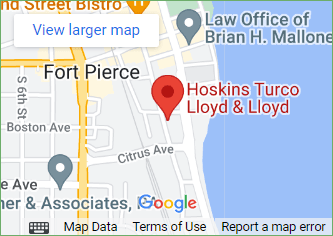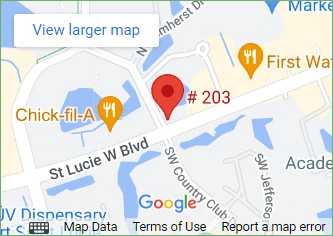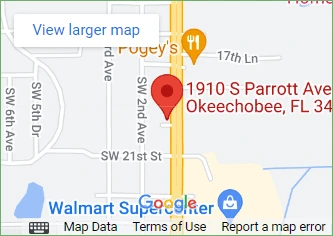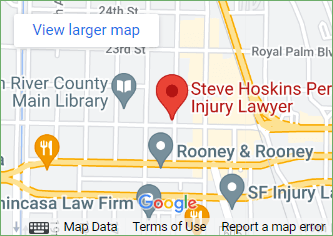Auto Accident Settlement
What to Know About Scooter and Moped Accidents
Scooters and mopeds are an increasingly popular method of transportation, especially in big cities and within beach communities. The Insurance Institute for Highway Safety (IIHS) reports that in 2018, there were more than 716,000 registered scooters in the U.S., making up over 8% of the total registered motorcycles category. That number doesn’t even begin to reflect the number of <50cc mopeds and scooters in operation. Many states don’t require these smaller displacement vehicles to be registered — although Florida does require all scooters to be titled and registered, but not mopeds.
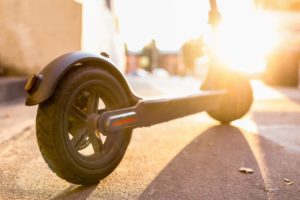
The dark side to the enjoyment and convenience scooters offer is that they can be involved in serious accidents. Whereas only .0079% of all motor vehicle crashes in Florida result in a fatality, 6% of all motorcycle accidents are fatal, which includes accidents involving scooters and mopeds. By the same token, e-scooters can injure pedestrians and other bystanders when operators use them unsafely — or when rental companies create dangerous conditions through flawed services.
In either type of scooter accident, major injuries can result. Repaying the costs of these injuries can be difficult for moped accident victims, especially if they are missing work. It is important to review your options for seeking a claim against all at-fault parties in these cases.
Speaking to a Treasure Coast scooter and moped accident legal team can reveal your options, which commonly involve filing an insurance claim or even potentially suing the parties responsible for your injury.
Common Types of Scooter and Moped Accidents That Cause Injuries
- Moped or scooter crash on a public road, causing operator injuries
- E-scooter crash involving an injured operator, pedestrian, bicyclist, or bystander
What Are the Different Types of Two-Wheel Powered Transport Vehicles?
When talking about accidents involving small-displacement vehicles, it helps to understand the different categories of vehicles based on their performance and design. Knowing the difference between a moped and a scooter could have a large impact on how your injury case proceeds.
Motorcycles
Technically, a “motorcycle” under Florida law includes any two-wheeled powered vehicle that the rider sits down upon, excluding pedaled mopeds (see more on mopeds below). Because of this broad classification, a “motorcycle” accident can include any collision involving a motorcycle, scooter, or off-road motorbike.
In Florida, all vehicles in the motorcycle category must possess a title and registration. The operator must have a valid license, and in most cases, their license must have a motorcycle endorsement to legally operate such a vehicle. There’s one exception: operating scooters with an engine displacement of 50cc and under only requires a valid driver’s license, no motorcycle endorsement needed.
Scooter
A “scooter” is typically a way to refer to a two-wheeled transport vehicle with a smaller displacement engine than a typical motorcycle. The Italian Vespa is a classic example. However, the primary difference between a scooter and a motorcycle/motorbike/dirtbike is where you put your feet. On a scooter, your feet go upon a flat surface just below the handlebar stalk. On a motorcycle, your feet are placed upon pegs on the outside of the vehicle, causing the rider to straddle the engine or chassis. In most cases, the engine of a scooter and the gas tank are both located under the rider’s seat. A scooter engine can be a four-stroke engine type or the noisier (yet more torquey) two-stroke type, which must mix oil and gas prior to combustion to operate.
Scooters can be quite low-powered, especially the more affordable ones. Some “micro” scooters are just 10cc, and they can only go a few miles an hour on a flat surface. Typical scooters made for public road use typically have an engine displacement size of 40cc – 50cc, allowing them to reach speeds of 30 mph – 45 mph. However, larger scooters exist that are made for highway travel or “touring”. These scooters are commonly 100cc, 150cc, even up to 400cc. That’s as big or bigger than many of the most common street motorcycles!
Moped
A moped is a type of scooter that uses pedals to start the vehicle and sometimes to aid in propulsion. Riders have to pedal the vehicle a few cycles to start the crankshaft and begin the ignition process. The rider can also choose to use the pedals to aid in propulsion uphill.
One trademark characteristic of mopeds is that they are typically cheap and very low-powered. They may be just 20cc, although 50cc models are common. Their low power can make them dangerous to operate on public roads with speeds in excess of 30 mph, considering that they have difficulty keeping up with traffic.
A moped does need to be registered in order to operate on public roads in Florida, although they do not require a title.
Electric Scooter (e-Scooter)
Technically, any scooter that uses an electric engine instead of a gas-powered engine is an electric scooter. However, many people instantly think of the simple stand-up scooters that consist mostly of a small board to stand on, two tiny wheels, a small electric motor, and a steering stalk that is essentially a small pair of handlebars. Unpowered versions sold under the brand “Razor” scooters were once ubiquitous, and the powered versions have become especially popular for short-term rental services.
Terms and conditions for operating an electric scooter depend upon the rental company. Most often, the rider is expected to hold a valid driver’s license, but they do not need any sort of motorcycle endorsement.
Accidents Involving Scooters and Mopeds on Public Roads
People enjoy the feeling of freedom and the ease of ownership that comes with a scooter, motorcycle, or moped. It’s true that nothing beats the sensation of riding in the open air along the Treasure Coast or leaning through a turn to get through town.
Unfortunately, that freedom comes at the cost of protection. Scooters, mopeds, and other two-wheeled vehicles have no protection for the rider to speak of. They lack the canopy, doors, or windshields that protect cabin occupants in a typical car or SUV. Not only that but scooters and mopeds lack the girth that can protect something like a heavy motorcycle in an accident. The light weight of the vehicle means the rider can be flung far from the impact point, as all the impact force gets transferred to the driver.
Common Types of Injuries From Scooter and Moped Accidents on Public Roads
Injuries are very likely when a scooter or moped is involved in a collision. Crash statistics for all motorcycle accidents in Florida show that 94% of the time when there’s a fatal accident it’s the motorcycle operator who dies. Further, 21% of motorcycle accidents result in incapacitating injuries, and 58% of motorcycle accidents result in non-incapacitating injury.
The most common types of injuries include:
- Traumatic brain injuries, which can even affect riders who wear helmets
- Fractures
- Back and spine injuries
- Head, neck, and shoulder injuries
- Deep abrasions (road rash), sometimes requiring skin grafts
- Internal organ injuries
Common Causes of Scooter and Moped Crashes on Public Roads
A few scenarios seem to appear again and again when looking at accidents involving a scooter or moped on a public road.
Drivers Turning Left in Front of the Vehicle
Judging the speed of a two-wheeled vehicle is more difficult compared to a typical car or truck. Four-wheeled vehicle drivers often underestimate the speed at which a scooter or motorcycle is traveling, and they will turn left in front of the two-wheel vehicle without enough time to get across the opposing traffic. As a result, the two-wheel vehicle will have to choose between a perpendicular “t-bone” accident, laying their vehicle down in traffic, or driving off the road to avoid a collision.
Vehicles Switching Lanes Into the Scooter or Moped
Mopeds and scooters lack the visibility of larger cars, trucks, or SUVs. As a result, some drivers will switch lanes not realizing a scooter or moped is alongside them. The two-wheeled vehicle will then likely collide with another vehicle or lose control.
Loss of Control After Hitting Loose Gravel or Sand
Loose road surfaces can be a literal deathtrap for two-wheeled vehicles of all kinds. They can cause one or both tires to lose traction and slip in an unexpected direction. An accident caused by loose sand, gravel, or other materials is especially likely when the patch of loose road is along a curve. Because the rider has to lean to turn, the sudden shift in the bike’s center of gravity can easily cause it to topple.
Rear-End, Failure to Stop
Drivers who fail to stop in time to meet the flow of traffic or to halt at a traffic signal can easily collide into a stopped scooter or moped. The difference in vehicle weights means that a collision that would be considered a “fender bender bumper tap” between two cars results in a splayed-out scooter operator.
Speeding, Reckless Driving, Driving Under the Influence
Tragically, many scooter, moped, and motorcycle accidents involve one or more parties driving in irresponsible ways. Drivers who choose to speed, act recklessly, or get behind the wheel while under the influence of drugs or alcohol always put their lives and the lives of others at risk.
Scooter and moped riders are often the victims of accidents caused by other drivers who were behaving dangerously on the road. Dangerous accidents are likely to happen given the low visibility of the scooter/moped and the difference in impact forces between the larger and smaller vehicle. Sadly, many such accidents result in the driver fleeing.
Even more tragic, operators who choose to ride their scooter or moped under the influence risk their own lives. According to the Insurance Information Institute (iii), 33% of all motorcycle operators who perished in an accident had alcohol in their bloodstream. Delayed reaction times and lowered observation skills can cause a minor mistake to turn into a big accident. And, yes, these often-slower vehicles can still be guilty of speeding upon backroads and through sharp curves, potentially resulting in a collision or running off the road.
Who Is At-Fault When Someone Is Hit on a Public Road While Driving a Scooter or Moped?
There are many parties who can share fault when a scooter or moped accident occurs.
Another vehicle driver is the most common culprit. When a vehicle operator fails to obey the rules of the road or fails to exercise reasonable care, they can cause an accident and significant injuries to scooter riders. Some accidents even involve multiple vehicles, where several drivers may share fault. For instance, a speeding driver could have hit someone following too closely to a moped, causing a “daisy chain” accident scenario.
The scooter manufacturer could be to blame in part or in full, as well. When a vehicle fails to meet expected safety standards because of a flawed design or shoddy manufacturing, that is considered an unacceptable risk to the operator. If your scooter is subject to a recall or had a braking failure or some other failure prior to your accident, then it is possible you may be able to file a claim against the manufacturer.
In some cases, the public road operator or private property owner could be to blame. Some road designs are deemed dangerous, such as an intersection that fails to properly direct traffic in a safe way or a traffic light system that isn’t working properly. If an accident occurred in a construction zone, it is possible that the road construction contractor may be liable.
More complicated cases can involve multiple liable parties, including if the scooter/moped operator somehow contributed to the accident. In Florida, all parties have to pay for their estimated percentage of liability. If the injured claimant has some portion of fault, their overall damages will be reduced by that portion.
There is no way to predict who is at fault until your case has been reviewed by an experienced Florida road accident attorney. When you are hurt, speak to a scooter accident lawyer near you as soon as possible to learn about your options for filing insurance and seeking a claim to repay your losses.
Accidents Involving e-Scooters
e-Scooters operating on public roads can get involved in any of the accident types above. At the same time, these vehicles pose a unique problem. Given their short-trip focus and the fact that they often appear in dense developments near cities, public parks, and neighborhoods, operators will frequently choose to ride these vehicles in places most vehicles are not allowed to go.
Making matters worse, the laws are hazy when it comes to where these small, motorized scooters are allowed to operate. Depending on the municipality, they may be allowed to operate on the sidewalks. They may also be banned from operating on public roads, forcing them to operate on the sidewalk.
Many municipalities have even set a limit of 15 mph for riding on sidewalks! That’s 22 feet per second — plenty of speed to cause a major injury when the e-scooter collides with a pedestrian, parking meter, or boardwalk.
Common Types of e-Scooter Injuries
Across the U.S., many individuals and municipalities have had growing concerns about the appearance of electric scooter rental services popping up. Many times, these companies are completely unregulated. They often ask for forgiveness rather than permission: dropping off hundreds of rental scooters in an area without so much as alerting the local city council or public safety authority.
A combination of negligent joyriders and careless companies has led to an epidemic of preventable electric scooter accidents along the Treasure Coast, not to mention mounting frustration. Data from Consumer Reports in 2019 shows a record of 1,500 e-scooter injuries from 2017–2019.
The most common types of injuries seen include:
- Traumatic brain injuries, from both riders and pedestrians, hit
- Head, neck, back, and spine injuries
- Fractures
- Severe cuts or bruises
- Abrasions (road rash)
- Strains and sprains
- Damage to joints and nervous system functioning
Most Common Reasons e-Scooter Accidents Occur
Driver Inexperience and Negligence
The most common thread seen in the majority of e-scooter rental accidents is that the driver was unprepared for the situation. After all, operating a scooter in a busy park or on a busy pedestrian walkway can be quite difficult. Add in the inexperience of the rider and the often highly questionable decisions they make, and you can create a recipe for an all-but-inevitable accident. Many operators also choose to take unacceptable risks: riding downstairs, weaving through obstacles, and generally going places a motorized scooter was never meant to go.
Collisions With Pedestrians, Bicyclists, and Bystanders
e-Scooter operators can fail to see pedestrians in time. They may also lack the skill to respond to a situation where they have to avoid a collision with someone. Since many of these accidents can happen at speeds in excess of 10 mph, the potential for injury is great. Injuries can be especially serious when the collision victim hits their head or has damage to their spine.
Making matters worse, you don’t have to be a pedestrian to be wrapped up in a scooter accident. People hit can include babies in strollers, people using roller skates, or even people minding their own business when sitting on a public bench. No one is safe when there are careless people on scooters zipping about!
Failure to Protect the Safety of Operators
Another common thread seen in e-scooter accidents is that the companies that offer rentals seem to care more about raising venture capital than offering a safe experience for riders. Many services do not require a helmet, and almost none require experience or safety training. As a result, the rentals can encourage people to try the service who has no experience operating any scooter. In some injury cases, an injured operator has been able to hold the rental company liable for injuries as a result of a failure to offer reasonable safety precautions.
Collisions With Vehicle Traffic
e-Scooters operating on public roads can very easily get snarled in an accident with other motor vehicle traffic. The high speed of the vehicle mixed with the lack of protections for the rider can easily result in a major injury.
Who Is At-Fault When an E-Scooter Accident Occurs?
Fault in an e-scooter accident often lies with the operator. Most rental services clearly spell out the risks and expectations for the rider. Service providers combined with local cities also take efforts to spell out the dos and don’ts of safe operation. When a rider chooses to ignore these recommended precautions and take unreasonable risks, they can be held liable for any injuries they later cause.
Operator carelessness is especially important to consider when an injury or death happens to their passenger. Passengers assume some level of risk when choosing to join someone on a rental e-scooter, but drivers are responsible for making safe decisions overall.
The e-scooter rental company can also be found liable for injuries, including those affecting an operator or an innocent collision victim. Injured claimants can argue that the service itself is unreasonably dangerous and that it failed to provide reasonable precautions to prevent injury. They may also fail to provide safe equipment, particularly in cases where the scooter was faulty or poorly maintained.
Rarely, a municipality or private property owner will be liable for the results of an e-scooter accident. This is only true in cases where the relevant property owner was aware of the foreseeable risks and did not take measures to address them. Such cases can be strong when the property owner set rules for an operation that was unreasonably dangerous, such as an outdoor mall owner that encouraged scooter traffic in heavy pedestrian areas.
Pursuing compensation with the help of an experienced Treasure Coast personal injury lawyer can help you determine who is liable for your injury costs and other losses.
What Types of Compensation Are Available After a Scooter or Moped Accident?
The compensation available depends on your losses and your individual case.
Typically, your insurance claim settlement or court award will include repayment of the following damages areas:
- Medical bills costs, including emergency treatment, medications, surgeries, and follow-up care
- Lost wages resulting from an inability to return to work or an inability to return to your old job
- Incidental expenses caused by the accident, such as a need to rent a vehicle or replace a destroyed scooter
- Pain and suffering is available in instances where there is a “serious injury”
Filing a No-Fault Insurance Claim vs. Seeking a Third-Party Liability Claim
If you have personal injury protection (PIP) insurance policy, chances are that you may be able to file for some of the costs of injury treatment. However, these policies only cover a portion of your costs.
If your treatment costs exceed the available policy limit, then you have the right to file a third-party claim against the bodily injury liability (BIL) policy of the at-fault party. Such a claim allows you to recover the excess costs not included in your PIP coverage. In addition, you may be able to seek damages for your personal pain and suffering if you have a qualifying “serious injury”.
Do I Need to Sue to Get Compensation After a Scooter or Moped Accident?
In most cases, you can obtain an insurance claim settlement for your injuries without having to file a lawsuit. However, some insurers will refuse to cover your full costs. Other times, the at-fault party may not have the insurance needed.
In any case, where out-of-court negotiations aren’t getting you closer to the settlement you need, filing a lawsuit is an option.
Review your case with an attorney early on to maximize the chances that your settlement will be successful and cover all of your losses. Your scooter accident attorney can also advise you when you may need to take the next step and bring the defending party to court.
Contact a Treasure Coast Scooter Accident Lawyer Who Cares
Hoskins, Turco, Lloyd & Lloyd has represented injury victims all along the Treasure Coast. We are highly concerned about the risks posed to scooter riders of all stripes, including those who rent e-scooters with unclear safety guidelines.
If you have been hurt in a scooter accident of any type, we are ready to talk to you about your case. Call today at (866) 460-1990 or contact us online now to schedule a free, confidential, no-risk case review.
Verdicts and Settlements
$1.2 Million
$1.6 Million
Wrongful Death Settlement
$11.1 Million
Settlement for motorcycle accident
Locations
Ft. Pierce, FL 34950
Suite 203, Port St. Lucie, FL 34986
Okeechobee, FL 34974
Vero Beach, FL 32960
The hiring of a lawyer is an important decision that should not be based solely upon advertisements. Before you decide, ask us to send you free written information about our qualifications and experience.
We are a debt relief agency and attorneys. We help people file for Bankruptcy relief under the Bankruptcy Code. The hiring of a lawyer is an important decision that should not be based solely upon advertisements. Before you decide, ask us to send you free information about our qualifications and experience.
Hoskins, Turco, Lloyd & Lloyd © 2020 All Rights Reserved. Terms of Use and Privacy Policy
This site is protected by reCAPTCHA and the Google Privacy Policy and Terms of Service apply.
